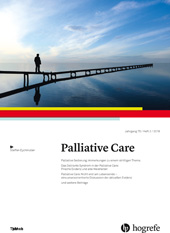Demenz aus palliativmedizinischer Perspektive: warum ein krankheitsspezifisches Advance Care Planning wichtig ist
Abstract
Zusammenfassung. Die Palliative Care muss sich im Zuge des demographischen Wandels vieler Gesellschaften rund um den Globus tiefgreifend wandeln. Sie muss mehr und mehr mit der Geriatrie zusammenarbeiten und geriatrische Expertise integrieren. Eine der zentralen Herausforderungen Geriatrischer Palliative Care ist die ethisch angemessene Therapieentscheidung für Menschen, die nicht mehr urteilsfähig sind. Nachdem der bisherige Ansatz herkömmlicher Patientenverfügungen erwiesenermassen enttäuscht hat, wird aktuell, gerade auch in deutschsprachigen Ländern, das systemische Konzept des Advance Care Planning (ACP) verfolgt. In diesem Artikel wird zunächst ACP mit seinen Zielen, Elementen und Effekten vorgestellt. Sodann wird gezeigt, weshalb es für Menschen mit Demenz eines adaptierten ACP-Programms bedarf und was ein solches demenzspezifisches ACP beinhalten muss.
Abstract. Palliative Care has to transform profoundly in the context of population aging in many countries around the globe. It has to collaborate increasingly with geriatric medicine and incorporate geriatric expertise. One of the pivotal challenges of geriatric palliative care is ethically appropriate decision making for patients who have lost decision-making capacity. While the traditional approach to advance directives (living wills) has demonstrably proven ineffective, the new approach that is currently being embraced, including in German-speaking countries, is the systemic process of advance care planning (ACP). In this article, ACP is first presented with its general aims, elements and effects. Second, it is shown why we need an adapted ACP program for people with dementia and what such a dementia-specific ACP must entail.



